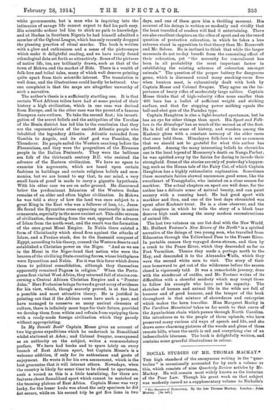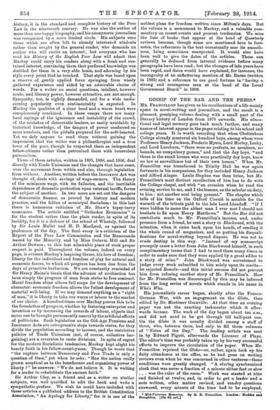SOCIAL STUDIES OF MR. THOMAS MACKAY.*
THE high standard of the anonymous writing in the "quar- terlies" is occasionally accounted for by such a volume as this, which consists of nine Quarterly Renew articles by Mr. Mackay. Be will remain most widely known as the historian of the Poor Law. Though his great work on that subject was modestly issued as a supplementary volume to Nicholls'.
• Ti, Deep. of Democren. By the late Thomas Mackey. London John Murray. Ds. zeta
history, it is the standard and complete history of the Poor Law in the nineteenth century. He was also the anthor of more than one happy biography, and his anonymous journalism was recognized by a more limited circle. His subjects were those which are often left to already interested students rather than sought by the general reader, who demands an author who will excite an interest; but everyone who has read his History of the English Poor Law will admit that Mackay could carry his readers along with a fresh and sus- tained interest, convincing them that profound knowledge was distilled for them in a very able brain, and adorning by his style every point that he touched. That style was based upon a reserve of gently applied force springing from wisely gathered experience and aided by an admirable choice of words. For a writer on social questions, intellect, however acute, and literary power, however attractive, are not enough. Sympathy, too, is rightly demanded, and for a wide undis- cerning popularity even sentimentality is expected. In Mackay the qualities of a clear head and a warm heart were conspicuously combined. In these essays there ar•e many hard sayings of the ignorance and instability of the crowd, of the mistakes of democratic leaders, so easily avoidable by historical knowledge, of the dangers of power conferred on mere numbers, and the pitfalls prepared for the soft-hearted. Yet we defy anyone to read them without gaining the impression that the writer was a philanthropist and a true lover of the poor, though he respected them as independent fellow-citizens rather than patronized them with benevolent paternalism.
Three of these articles, written in 1895, 1898, and 1906, deal directly with Trade Unionism and the changes that have come, over the movement from within and also, through legislation from without. Another, written before the Insurance Act was thought of, deals with savings of wage-earners. The theory of the minimum wage, with its fallacies, and the inevitable dependence of domestic protection upon external tariffs, forms the subject of another. In two more are set out the dangers of democratic finance, as proved by history and modern practice, and the follies of municipal Socialism: in this last there is humorous criticism of Mr. Shaw's topsy-turvy economics. The article entitled "Orthodox Economics" is for the student rather than the plain reader, in spite of its lucidity, for it is a defence of the school of Whately, followed by Sir Louis Mallet and H. D. MacLeod, as against the professors of the day. The final essay is a criticism of the Report of the Poor• Law Commission and the Memoranda issued by the Minority and by Miss Coterie Hill and Sir Arthur Downes to this last admirable piece of work proper respect is paid. Throughout the volume, indeed on every page, is evident Mackay's inspiring theme, his love of freedom; liberty for• the individual and freedom of play for natural and economic forces, to which all progress has been due from the days of primitive barbarism. We are constantly reminded of Sir Henry Maine's thesis that the advance of civilization has been simply the progress of man from status to free contract. Moral freedom alone allows full scope for the development of character: economic freedom allows the fullest development of material well-being. If we may demand anything as a "right of man," it is liberty to take our wares or labour to the market of our• choice. A hundred times over Mackay proves this to be the foundation of progress, whether by fostering enterprise and invention or by increasing the rewards of labour, objects that never can be brought permanently nearer by the artificial efforts of politicians. Such legislation as the Old-Age Pensions and Insurance Acts are retrogressive steps towards endue, for they divide the population according to income, and the restrictive policies of Trade Unionism (not, of course, collective bar- gaining) are a reversion to caste divisions. In spite of regret for the modern Socialistic tendencies, Mackay kept alight his hearty faith in his fellow-countrymen. Though he wrote that "the rupture between Democracy and Free Trade is only a question of time," yet when he asks: "Has the nation really grown sceptical as to the beneficence and organizing power of liberty " lie answers : "We do not believe it. It is waiting for a leader to rehabilitate the ancient faith."
Sir Arthur Clay, as a friend and as a writer on similar subjects, was well qualified -to edit the book and write a sympathetic preface. We wish he could have included with these articles a published address to the British Constitution Association, " An Apology for Liberty," for it is one of the noblest pleas for freedom written since Milton's days. But the volume is a monument to Mackay, and a valuable com- mentary on recent events and present tendencies We miss the lists of books that appear at the head of Quarterly reviews, because, though some are mentioned here in foot- notes, the references in the text ommionally mar its smooth- ness, being sometimes unexpected. It would also have been well to give the dates of the articles. These can generally be deduced from internal evidence before many paragraphs have been read ; but the changes of late years have been rapid, and dates would have explained, for instance, the incongruity of an unflattering mention of Mr. Burns (written in 1895) and a reference to our good fortune in " having a strong and courageous man at the head of the Local Government Board" in 1909.















































 Previous page
Previous page